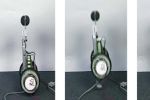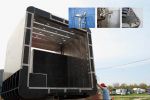Gizmodo on Stephen Conroy and Internet Filtering
Last night, Senator Stephen Conroy appeared on the ABC TV program Q&A, and spent almost half the program defending his internet filter plans. More than 2000 people sent questions on the issue, and yet the Senator somehow managed to avoid most of them by repeating the same old boring arguments. And because we have the ability to analyse the arguments, we're going to refute each one of them, one by one.
The show began with each of the other panelists stating their opinion on the issue, and unsurprisingly the overwhelming opinion was of concern about the filter, or at the very least concern over how the situation is being handled. The exception was Sun Herald columnist Andrew Bolt, who seemed to do whatever he could to disagree with popular opinion at every opportunity.
"The trial is to establish what is possible" Senator Conroy began, before going on to explain that there have been previous, much publicised trials conducted by previous governments which had shown that software could slow the internet down between 3 and 87 per cent. Of course we already knew this, although the Senator made no effort to mention that even though this trial was completed a couple of years ago, the most effective filters impacted performance the most, while the 3% slow-down filter let stuff through like ping pong balls through a basketball net.
Still, technology has improved significantly since the last trial (apparently), so the government is "not afraid to have a trial to find out" to see if its progressed sufficiently. They will then be "guided by the trial". The problem with this is the quality of information received from the trial - considering the participating ISPs (with the exception of iPrimus) aren't exactly major players, and the fact that iPrimus was leaving the option to volunteer for the trial up to its members, the results you can expect will be questionable at best and misleading at worst.
Next, Conroy moved onto the issue of what will be blocked, and the issue of the leaked ACMA blacklist on Wikileaks. "The blacklist has existed for nine years", the Senator said. A few times. "And" he continued, with a wave of his hands and a growing air of confidence, "it hasn't destroyed the net; it hasn't caused mass panic." Someone should tell him that's because we can still access the sites on the list. Not that we condone or suggest that we ever want to visit a child porn or pro-rape site, but any site that happens to be incorrectly placed on the blacklist (like Wikileaks, perhaps?) is still accessible, so it's not an issue that effects our browsing experience.
But that's when things started to venture away from normality and into the absurd.
"Now I'd like to talk about the dentist, 'cos that's be agood lot of fun this week. Here's what happened... The Russian Mob"...
WTF? The Russian Mob? Okay Conroy, you piqued my interest. Continue...
"...targeted Queensland small businesses last year. What they did was identify websites that had blank pages underneath the main page. And what they would do, they'd put some material that would be refused classification on that site, on that one page within that site. Then they spam all the people who'd be interested in looking at this material. And we were advised by international agencies that this was what was happening. And so it was blocked internationally - it was never blocked in Australia. And then, it went away.
.... And to give you an example of the sort of success that they can have, they targeted a while ago, the Czech astronomy services. And within an hour or two of them sending out their spam, 12 million people had accessed vile child porn, that was attached to the Czech astronomy site"
The problem here is that because the blacklist is supposed to be kept secret - that there's no transparency in the process as to what content will be blacklisted, this means that any victim of this sort of attack will essentially lose their website and any associated business because they'll have no idea why people can't access their site. Not only that, but there's no way to ensure that these kinds of attacks are filtered - if the site's not on the blacklist, then people will still be able to access it, and by the time the Government, or the ACMA or the classifications board has noticed and added the site, the damage will have already been done.
Continued on the next page...
Story from Gizmodo Australia
Popular Tags
SciTech
Regular Features
| regarding | user | just commented |
|---|---|---|
| Earth Hour Approaches | Ulyssus | I completely missed it |
| A Fashion Geek Release Party | Ulyssus | She's come up with some |
| Pole-Dancing Robots | We_Major | In class the other day we |
| Wacky Inventions Real and Imaginary | We_Major | I really don't think we need |
| Fashion Geek Release Party | We_Major | A lady came into work the |
Popular on Popsci
Most Viewed
SciTech
- What a Difference 200,000 Years Makes
- Is That Your Final Answer?... Really?
- Guitarists' Brains Play in Concert
- Animals in Alignment
- Dinosaurs, and the Stories They Tell
- Happy Birthday, Web!
- How to Hit Better Returns in Tennis
- If You Dropped a Corn Kernel From Space, Would it Pop During Re-entry?
- Audience Gender Sways Choice
- Raising Children Not Expensive
Most Commented
SciTech
- Flying Car Completes Its First Flight, Promises to Be Totally Unaffordable
- Fashion Geek Release Party
- A Fashion Geek Release Party
- Wacky Inventions Real and Imaginary
- Pole-Dancing Robots
- Windows 7 Might Block Third-Party Video Codecs
- Tested: The Qantas A380
- Provector 'Flower' Is the Pesky Mosquito's Deadly Siren Song
- Sex, Hygiene, and Gardening
- Sound Becomes Light








